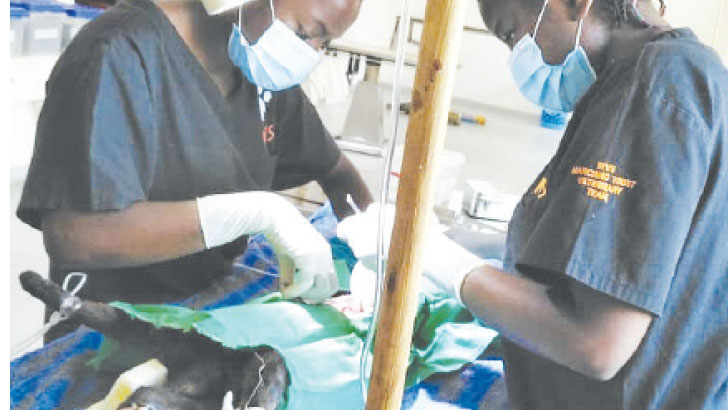Malawi’s first female veterinary graduates
Doctors Muonaouza Deleza and Love Kaona were the only women who graduated from Malawi’s first class of veterinarians at the Lilongwe University of Agriculture and Natural Resources (Luanar) in 2019.
Since graduating, they have both been championing animal welfare and health in the country, with Deleza working as clinical veterinarian for the Blantyre SPCA—offering no-cost vaccinations, sterilisations and other treatments to dogs and cats from low-income households.
With Malawi as one of the world’s rabies hotspots, the virus places a huge burden on the country’s health system, but vaccinating dogs can prevent this vicious disease.
Deleza also plays an important role of educating the Blantyre community about rabies and preventing needless deaths in children and animals.

On the other hand, Kaona has focused on protecting Malawi’s natural heritage as a wildlife veterinarian.
She first worked for the Lilongwe Wildlife Trust, rehabilitating injured and rescued wildlife and has since undertaken wildlife health monitoring at Kuti Wildlife Reserve, funded by Loop Abroad.
In 2021, Kaona supported the translocation of 12 zebra and 16 waterbucks to Kasungu National Park as part of a huge team effort among the Department of National Parks and Wildlife, Agricane, IFAW and Kuti Wildlife Reserve.
With only three wildlife vets licensed to practise in Malawi, her commitment to the profession is a big step in growing the country’s wildlife veterinary capacity—helping to make such historic translocations possible.
Amid economic difficulties brought by the Covid-19 pandemic, these two young women are shaping a healthier Malawi for humans, animals and nature alike.
Who are they?
Love Kaona
Aged 27, Kaona is the last born of 11 children in her family. Her father had stroke when her mother was expecting her. He had to leave his job as a result and life became a struggle.
“I used to go to school on an empty stomach, bare footed and without school uniform until I reached secondary school where it was compulsory. And we never had power (electricity) at home for night studying,” the young veterinarian explains.
Even though her parents never went far with education, they encouraged her and her siblings to work hard in school.
She was raised in a society where early marriages are common, which got her parents genuinely worried for her.
“They advised me to end friendships with the girls who had boyfriends. My friends and the people in my society used to look down on me for reaching my 20s with no husband and children. But the lessons and encouragement I got from my family were enough to keep me going. I wish to encourage girls in my community to work hard in school,” she explains.
Life took a better turn when her older siblings became independent.
She was moved to Michiru Private Secondary School, as she was going into Form Four.
“This helped me a lot because I lacked motivation. I thank God for my parents and siblings who helped me to be what I am,” Kaona explains.
As a wildlife vet, she clearly likes the challenge.
“Animals can be stressed easily to the point of death and become a danger to the point of killing you. These things make me alert and more focused,” she says.
“Working with wildlife, you work with insects, birds, reptiles, amphibians and mammals. This gives me the opportunity to have a working experience with a lot of animals,” she adds.
On why she chose a career in wildlife, Kaona explains that unlike domestic animals, which have owners who care for and protect them, in most cases, wild animals are owned by the government.
And being part of the Malawi Government, Kaona feels she can serve her role better in protecting and caring for these ‘vulnerable’ animals.
She also notes the importance of wildlife health in the country, arguing that it is sad that wildlife medicine is a neglected field.
Looking ahead, Kaona aspires to pursue a Master’s degree in Wild Animal Health and join the academia as a lecturer in Wildlife Medicine when opportunity arises or become a government wildlife doctor someday.
“In our early years, people used to scare us that we are going to be withdrawn. And with just the two of us proceeding from the pre-vet out of 12 women, it was scaring. But getting to the final years, we became role models for a lot of girls. It was an amazing experience,” she explains.
She feels that women in Science technology Engineering and Medicine (Stem) face a lot of challenges.
“Even when some people know that you are pursuing science or any other area in Stem, they just look down on you,” she says.
Muonaouza Deleza
She is a veterinary surgeon, born on June 17, 25 years ago. She is the second-born in a family of four boys and three girls.
Being a daughter of a mother who is a medical doctor and an entrepreneur father, her family moved a lot because of the nature of her mother’s job.
This meant transferring to different schools within a short period. The adjustment from one school to another was was so challenging such that she was put in boarding school when she was in primary school.
“I went to St Anthony Primary School [Zomba when I was in Standard Seven. Being at a boarding school made me start liking to study, which resulted in good grades and then I was selected to Stella Maris Secondary School in Blantyre. After sitting for my Malawi School Certificate of Education (MSCE) examinations, I was selected to Luanar to study Veterinary Medicine,” she recalls.
Deleza says working at BSPCA is a lovely experience as they get to save animals that would have otherwise died without being given treatment.
“We also rescue various animals that have been neglected and provide them shelter. We also work hand-in-hand with community leaders to provide awareness to communities concerning various diseases, especially zoonotic diseases such as rabies,” says Deleza.
She believes it is important to serve her community through veterinary services because animals are part of day-to-day encounters.
“Having a healthy animal population in my community will also improve human health by controlling the spread of zoonotic diseases,” she adds.
Deleza also emphasises on the importance of canine health in the country, saying a lot of households keep dogs as companions and these dogs can harbour diseases that could cause fatal diseases in humans, for example, rabies and echinococcosis.
Among other things, Dleza aspires to improve human and animal welfare in Malawi and in other African countries through one health approach; hence, she plans to advance her studies in one health veterinary epidemiology.
As one of the only two female vet students in her class, the young woman says being a vet student on its own was challenging as they were pioneering the programme “and with shortage of resources such as books and lecturers, it was difficult to study the course”.
“Being a female was also challenging, especially being in minority to males. There were a lot of discouragements, but there was still some inspiration from older female vets that have made it. These became my motivation that I could also make it, just like them,” she says.



